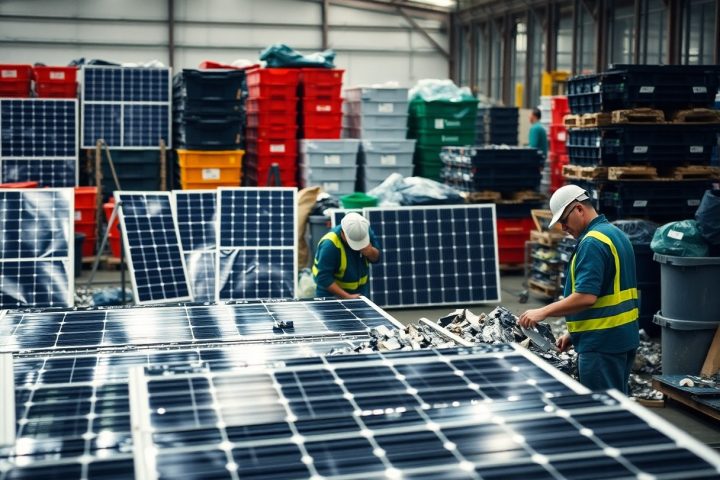Recycling solar panels is an crucial step in ensuring a sustainable energy future. As the use of solar energy grows, so does the need to address the environmental impact of decommissioned panels. You might wonder how the recycling process works and why it matters for both the planet and your own energy choices. In this post, you will learn about the steps involved in recycling solar panels, the valuable materials recovered, and the benefits of supporting a responsible recycling industry.
The Environmental Impact of Solar Panels
To understand the broader implications of solar energy, it’s crucial to consider the environmental impact of solar panels throughout their lifespan. While they provide a cleaner alternative to fossil fuels, their production, use, and disposal can also have significant ecological effects. Assessing these impacts is critical for anyone interested in adopting solar technology in a sustainable manner.
Resource Extraction and Manufacturing
Around the world, the extraction of raw materials necessary for solar panel manufacturing involves processes that can lead to environmental degradation. Mining for materials such as silicon, silver, and various metals often results in habitat destruction, water contamination, and significant carbon emissions. Understanding the extraction process helps you appreciate the balance between energy production and environmental stewardship.
End-of-Life Waste Concerns
Extraction and production of solar panels create not just environmental benefits but also concerns regarding waste once these panels reach the end of their effective life. As solar panels age and become less efficient, improper disposal can lead to toxic materials entering the environment, underscoring the need for responsible recycling practices.
Understanding the end-of-life waste concerns associated with solar panels is vital. Currently, many panels are not recycled, leading to an accumulation of electronic waste in landfills. This not only wastes valuable materials but also poses risks of chemical leaching into soil and water systems. As more solar panels reach the end of their operational life, developing effective recycling solutions becomes increasingly important for minimizing these risks and promoting sustainability in the solar energy sector.
The Recycling Process of Solar Panels
While the recycling process of solar panels involves several key steps, it is necessary to ensure that valuable materials are efficiently recovered and harmful substances are disposed of responsibly. The overall procedure begins after you decide to recycle your solar panels, kicking off a systematic approach aimed at minimizing waste and maximizing material reuse. Understanding this process helps you make informed decisions about sustainability and your contribution to a circular economy.
Collection and Transportation
For recycling solar panels, the first stage is collection and transportation. You need to ensure that the panels are gathered from your location and safely transported to a designated recycling facility. This step is vital to facilitate the recovery process and requires adherence to specific regulations regarding hazardous materials, ensuring the panels are handled with care throughout the journey.
Material Recovery Techniques
Between various techniques used for material recovery, methods such as mechanical separation, shredding, and chemical processes allow for the efficient extraction of raw materials. You should be aware that these techniques focus on recovering silicon, silver, and glass from the panels, which can then be repurposed in new products.
But it’s important to note that while mechanical processes break down the panels, chemical methods can help dissolve and recover specific components, such as metals that require a more delicate touch. By utilizing these advanced material recovery techniques, recycling facilities can significantly increase the overall yield of materials, contributing to a more sustainable way of producing new solar panels and reducing environmental impacts. As you consider the lifecycle of your solar panels, understanding these methods will reinforce the importance of recycling in promoting a greener future.
Benefits of Recycling Solar Panels
Now, understanding the benefits of recycling solar panels is vital for promoting a sustainable energy future. Recycling not only helps mitigate environmental impact but also provides opportunities for resource recovery. By participating in solar panel recycling, you contribute to a circular economy, ensuring valuable materials are reused and reducing the demand for new resources. This practice supports environmental responsibility while also potentially lowering the costs associated with raw material extraction and processing.
Reducing Landfill Waste
To effectively manage the lifecycle of solar panels, recycling plays a vital role in reducing landfill waste. When you recycle solar panels, you minimize the volume of electronic waste that ends up in landfills, which can pose significant environmental hazards. This proactive approach helps protect soil and groundwater from the harmful substances often found in discarded panels, thereby promoting a healthier ecosystem.
Conserving Resources and Energy
Reducing the need for new raw materials through recycling has significant benefits for resource conservation and energy savings. By recycling solar panels, you diminish the demand for resource-intensive mining and processing of materials such as silicon, glass, and metals. This not only conserves natural resources but also lowers energy consumption associated with manufacturing new solar panels.
For instance, the energy required to recycle materials from old solar panels is typically much lower compared to the energy needed to extract and refine new materials. By reusing valuable components, such as silicon and metals, you help decrease greenhouse gas emissions associated with production processes. This not only supports a cleaner environment but also aids in transitioning to a more sustainable energy economy, aligning with your commitment to environmental stewardship.
Challenges in Solar Panel Recycling
Not all solar panels are created equal when it comes to recycling. The materials and technologies used in solar panels can complicate the recycling process, leading to inefficiencies and increased costs. Additionally, the lack of standardized recycling programs and regulations can create further obstacles. It’s crucial to address these challenges to create a sustainable recycling ecosystem for solar energy systems.
Economic Viability
Across the globe, the economic feasibility of recycling solar panels remains a significant concern. High upfront costs associated with advanced recycling techniques can deter companies from investing in sustainable practices. Moreover, fluctuating material prices can impact the profitability of recycling operations, making it less attractive for businesses to pursue.
Technological Limitations
On the technical side, current recycling methods may not efficiently recover all valuable materials from solar panels. The complexity of panel designs and the variety of materials used contribute to this challenge. As innovations in recycling techniques develop, there remains a pressing need to improve existing processes.
For instance, many traditional recycling methods struggle to separate and recover the diverse materials found in solar panels, such as silicon, glass, and metals. This inefficiency can lead to a significant loss of valuable resources, making the recycling process less sustainable. Additionally, older panel designs can incorporate materials that are difficult to recycle, causing further complications. As technology advances, addressing these limitations will be vital to maximize resource recovery and minimize environmental impact.
Regulatory Framework and Industry Standards
After understanding the significance of recycling solar panels, it is crucial to consider the regulatory framework and industry standards that govern the process. These guidelines ensure that recycling is conducted safely and effectively, promoting sustainability while protecting the environment. Compliance with these regulations not only aids in the responsible disposal of solar panels but also supports the growth of a circular economy within the renewable energy sector.
Current Regulations
Any discussion on solar panel recycling must begin with current regulations that dictate how manufacturers and recyclers handle end-of-life panels. Many regions have implemented strict policies that mandate proper disposal and recycling processes to mitigate the environmental impacts of solar panel waste. Familiarizing yourself with these regulations can empower you to contribute to sustainable practices in your community.
Future Legislative Goals
Any advancements in solar panel recycling will rely on future legislative goals aimed at improving recycling efficiency and establishing industry-wide standards. Policymakers are exploring ways to enhance existing regulations and encourage innovation in recycling technologies. By understanding these goals, you can stay updated on potential changes that may impact how solar panels are recycled and what role you can play in these developments.
Indeed, the future of solar panel recycling hinges on the establishment of comprehensive legislative goals that address the increasing demand for sustainable practices. Lawmakers are focusing on creating incentives for manufacturers to design panels with recyclability in mind, alongside efforts to develop advanced recycling technologies. As a result, you can expect more robust regulations that not only facilitate better recycling practices but also promote a circular economy, minimizing waste and protecting the environment for future generations.
Innovations in Solar Panel Recycling
Unlike traditional waste management practices, innovations in solar panel recycling focus on developing more efficient methods to recover valuable materials. Cutting-edge technology aims to enhance the recycling process, allowing for the extraction of silicon, glass, and metals with minimal environmental impact. As the solar industry grows, so too does the necessity for improved recycling solutions that not only address waste but also support sustainability goals.
Research and Development Efforts
To meet the increasing demand for effective solar panel recycling, substantial resources are being allocated to research and development initiatives. Various organizations and companies are collaborating to create advanced recycling techniques that can maximize material recovery while reducing energy consumption. These efforts are vital for ensuring that the solar energy sector remains environmentally friendly and economically viable.
Case Studies of Successful Programs
Solar panel recycling programs around the world have demonstrated significant successes, showcasing innovative methods to reclaim imperative materials.
- In Germany, the PV Cycle initiative reported a recycling rate of over 95% for solar panels, effectively recovering valuable components.
- The U.S. solar panel manufacturer First Solar boasts a 90% recycling rate, turning waste into new products while operating a closed-loop system.
- In Canada, the Solar Industry Association launched a program that has recycled over 1,000 tonnes of solar panels within the first year of implementation.
- France’s legislation mandates recycling of expired solar panels, leading to 80% recycling rates nationwide.
For instance, case studies from various countries highlight the effectiveness of structured recycling programs, showcasing remarkable results that strengthen the solar panel industry’s sustainability. Through rigorous implementation and community engagement, these programs set a benchmark for environmental responsibility. Notably, the collaboration of multiple stakeholders is crucial for scaling these initiatives, ensuring that valuable materials are not lost and that environmental ethics are upheld.
To wrap up
Considering all points, understanding how solar panels are recycled and why this process matters can greatly enhance your awareness of sustainable energy. As you invest in solar technology, knowing the lifecycle of your panels empowers you to make informed decisions that benefit both the environment and your finances. Emphasizing recycling ensures that valuable resources are reclaimed, minimizing waste and supporting a circular economy. By prioritizing responsible solar panel disposal, you contribute to a cleaner, greener future for generations to come.




